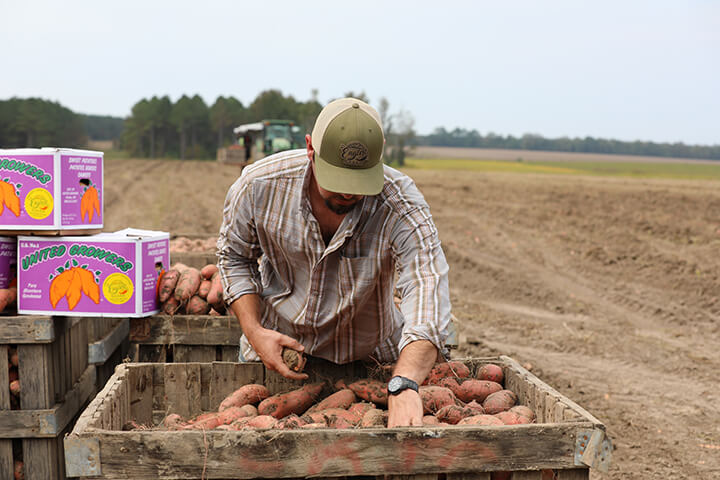As people from all walks of life continue to be affected by the rapidly changing COVID-19 situation, sweet potato farmers across Mississippi have been forced to respond in different ways. In fact, the pandemic has dramatically affected the supply chain, changing producers’ profitability, how farmers and packing facilities conduct operations and the prices consumers are paying at the retail level.
“We’ve had peaks and valleys with COVID-19,” says Robert Riggle, Owner and President of United Growers & Packers. “We had some very good months (where demand increased) when people were quarantined. I think consumers were getting back to old fashion ways of cooking, and were using sweet potato products. I think it was fantastic. Since many COVID regulations have been lifted, people can’t wait to get out of the house, and it seems like consumer purchasing has gone the other way.”
At the beginning of the pandemic, market unknowns forced those within the sweet potato industry to question how to move forward, Riggle said. Many sweet potato processing and packaging plants closed for a while, contributing to the increase in Mississippi’s unemployment rate, which topped out at 16.3% in April.
“Nobody knew what direction to take and things really slowed down,” Riggle said. “I don’t think that we’re going to know the full ramifications of everything until we’re closer to the end of the year.”
As the third top producing state of sweet potatoes with a production value of $95 million, Mississippi depends on the sweet potato industry to contribute a substantial amount of revenue to the state’s economy. That revenue is generated by the 172 sweet potato farms in the state.
For the sweet potato farmers who run those farms, COVID-19 presented other challenges. Since some of the processing plants were temporarily shut down, farmers were forced to store the sweet potatoes they would typically buy.
“The sweet potatoes we personally harvested last year sold by the time COVID hit,” sweet potato farmer Caleb Englert said for Farm Families of Mississippi. “So, it was easier for us to keep on with business as usual. But, because we’ve all already harvested a new crop and nobody wants to buy the old crop, other farmers will lose income on the potatoes they could not sell before the pandemic.”
Although growing sweet potatoes did not change during the pandemic, getting the resources needed to do the work did, Englert said.
“What got harder was getting the stuff we needed to operate, like (equipment) parts,” he said. “It took a long time for stuff to get here.”
In addition, all federal government offices shut down for a period, preventing farmers from accessing USDA resources, like the Farm Service Agency.
Producing, packaging and processing sweet potatoes were not the only pieces of the supply chain COVID-19 affected. The retail section of the supply chain also suffered, Sweet Potato Sweets Manager Judy Holder said for Farm Families of Mississippi.
“We closed to curbside pickup only for several weeks at the beginning (of the pandemic),” Holder said. “Business slowed down drastically when everything hit in March.”
Although business slowly picked up over the summer, Holder said the pandemic changed the way the bakery served its customers.
“We required our customers to wear a mask and implemented the safe distancing practices,” she said.
Sweet Potato Sweets ships their products to customers across the country. During the pandemic, the bakery’s online sales increased, affecting how their products were delivered to loyal customers.
As far as looking to the future, members of the sweet potato industry are staying positive.
“We are focusing on getting ready for the holidays, and hoping we can hold the (Sweet Potato) Festival next year,” Holder shared.
“We’re preparing for the retail of sweet potatoes to increase again,” Riggle said. “I believe stores are going to become busier through the holiday season as people, especially older people, are still cautious about getting out and would rather cook at home.”
“These are unprecedented times creating unique situations for everyone, from businesses to families,” said Jon Kalahar, a spokesperson for Farm Families of Mississippi. “With sweet potatoes being one of our leading crops, we all remain optimistic and committed to supporting our local farmers.”


